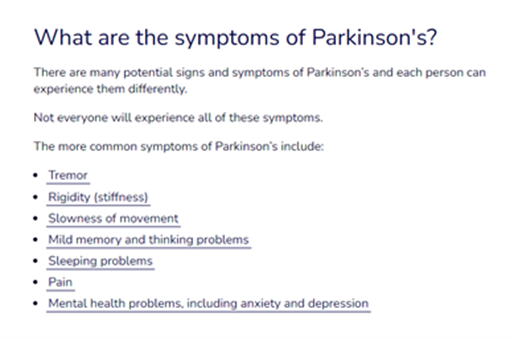
Just over a year ago, someone close to me was diagnosed with Parkinson's. The road to diagnosis, acceptance and support has been a long one. On #WorldParkinsonsDay, here are five pieces of advice I wish I'd received back when it all began...
🧵👇(1/23)
🧵👇(1/23)
Disclaimer: I realise that everyone’s experience will be different. These are personal reflections, not necessarily meant to be generalisable. With that said, here we go… (2/23)
1. Know the signs: Everyone knows the pitfalls of Googling symptoms. You think you’ve got a mild ailment and suddenly some dodgy website is mistakenly telling you you’ve got a life-threatening illness. (3/23)
With Parkinson's, as the symptoms are so varied, it can be particularly hard to connect the dots. For us, we observed physical symptoms - rigidity, slowness in movement – but there was a significant mental side too – emotional instability, anxiety… (4/23)
@ParkinsonsUK list a clear breakdown of symptoms here. If you start observing any combination of these symptoms, it may be worth seeking a consultation. (5/23) bit.ly/3JHuvot 

2. Express concern sensitively but firmly: During lockdown, we were all, to varying degrees, having a tough time. I’m always wary of pathologizing, and I think my family and friends were similarly reluctant to tell someone “You don’t seem yourself”. (6/23)
Particularly during the pandemic, it was easy to point to external factors – “Yes, I’m not feeling great at the moment, but I’ve been furloughed, I can’t go out for dinner, my mates are isolating – is it any wonder I’m not at my best?!” (7/23)
This made it difficult to broach the subject. The person you’re concerned about might feel patronised, or even attacked, when you start expressing your worries to them. But ultimately, you owe it to them – and to yourself – to ensure they get a professional opinion. (8/23)
You know how to speak to your family/friends better than anyone, but do your best to explain that it’s only because you love and care about them that you’re being so incredibly persistent and annoying about your concerns. (9/23)
3. Seek support early: It’s no secret that a lack of NHS capacity means it can be incredibly hard to get appointments/consultations for anything that isn’t deemed an immediate emergency. (10/23)
We waited an astonishing length of time before an appointment was secured, and even then it was only a phone consultation, rather than a video call (let alone an in-person appointment). (11/23)
We were initially told physical symptoms were due to a sports-related trapped nerve and that seeing a physio was the way forward. It was only after further months of concern (and a fair bit of familial badgering) that we secured an in-person neurologist appointment. (12/23)
Here, we were incredibly fortunate to have the means to go private. There’s another thread to be written here on the injustice of this. It’s as terrifying as it is infuriating to think how long we might have waited otherwise. (13/23)
This still sits very uncomfortably with us and it’s certainly not something to be included within a ‘general advice’ thread, as I know it’s not advice that everyone has the means to follow. (14/23)
I guess what I would say is that had we been better equipped with knowledge of symptoms and acted earlier, we would have been more likely to get the right support much, much earlier, through the NHS, and ultimately get the diagnosis. This brings me to the next point. (15/23)
4. Know that great support is out there: Getting the diagnosis was, of course, incredibly challenging. While Jeremy Paxman, Michael J Fox and others have shown that one can live a productive and meaningful life with the disease… (16/23)
… I think there was still part of us that thought “Oh right, well that’s it then” and made all manner of unhelpful leaps. Now, a year on, we think of the diagnosis as *the* pivotal moment in getting the support that was needed. (17/23)
Crucially, a diagnosis has meant access to support (read: drugs) that can go a very long way to alleviating symptoms. I cannot tell you the difference that this has made. It really is night and day between how things were back in 2020 and how they are now. (18/23)
Of course, Parkinson's still presents challenges and plays on our minds a fair bit. The symptoms sometimes come back and drug dosage will be a continuous, life-long negotiation with the neurologist. (19/23)
However, knowing that we have the diagnosis and that they’re getting the support they need means that I can speak/write about it all as freely and as openly as I am now. This brings me to my final point. (20/23)
5. Seek out experience and expertise: Some 145,000 people in the UK have a Parkinson’s diagnosis, so the chances are you know someone directly/indirectly affected by the disease. If you can, speak to those with first-hand experience of negotiating some of this stuff. (21/23)
More generally, for helpful information, advice and guidance, I’ve found the @ParkinsonsUK website an invaluable resource. They get the tone just right, balancing the medical with the personal. (22/23) parkinsons.org.uk
Right, that’s it. If you’ve found this thread useful, feel free to share it. I’d also welcome any additions, edits and reflections. (23/23) #WorldParkinsonsDay2022
• • •
Missing some Tweet in this thread? You can try to
force a refresh



